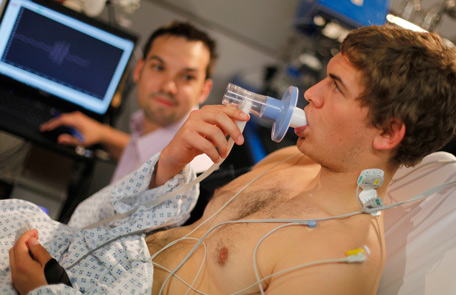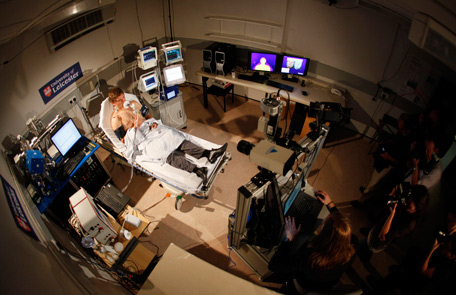- City Fajr Shuruq Duhr Asr Magrib Isha
- Dubai 04:32 05:49 12:21 15:48 18:47 20:04

Medical student Tom Geliot is examined in the Diagnostics Development Unit at the Leicester Royal Infirmary in Leicester, central England. The University of Leicester researchers have surrounded a normal hospital bed with an unprecedented array of technology, including technology originally developed for space research to examine patients in a non-invasive way. (REUTERS)
Now you can know what you are suffering from without any test! A sickbay that uses space-age technology to diagnose diseases ranging from stomach bugs to cancer has been unveiled at a British hospital.
This is no some si-fi movie, it is first of its kind, and contains a bewildering array of equipment, including probes designed for missions to Mars, dailymail reports.
You can now say adieu to painful and invasive tests as the gadget in the million-pound unit can detect illness minus the hassle. They combine information about the sight, smell and ‘feel’ of a disease to produce a diagnosis.
 (REUTERS)
(REUTERS)
Professor Mark Sims, the Leicester University space scientist who led the project alongside Tim Coats, a professor of emergency medicine, said: ‘In the old days, it used to be said that a consultant could walk down a hospital ward and smell various diseases, as well as telling a patient’s health by looking at them and feeling their pulse.
What we are doing is a high-tech version of that to help doctors diagnose the disease. We are replacing doctors’ eyes with state-of-the-art imaging systems, replacing the nose with breath analysis, and the “feel of the pulse” with monitoring of blood flow using ultrasound technology and measurement of blood oxygen levels.’
The diagnostics development unit is part of Leicester Royal Infirmary’s A&E department. One group of instruments, the ‘eyes’, uses thermal imaging technology developed by the university’s space scientists to search for life on Mars to hunt for signs of disease via the surface of the human body.
 (REUTERS)
(REUTERS)
For instance, it should be possible to get information about blood chemistry that points to liver or kidney problems without even taking a blood sample.
The unit will initially be used to check out at patients thought to be suffering from heart failure, pneumonia and serious, body-wide infections.
![]() Follow Emirates 24|7 on Google News.
Follow Emirates 24|7 on Google News.